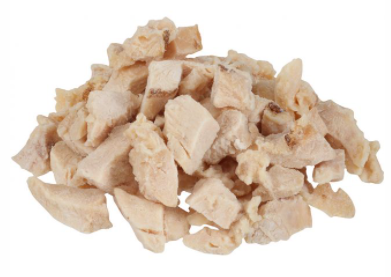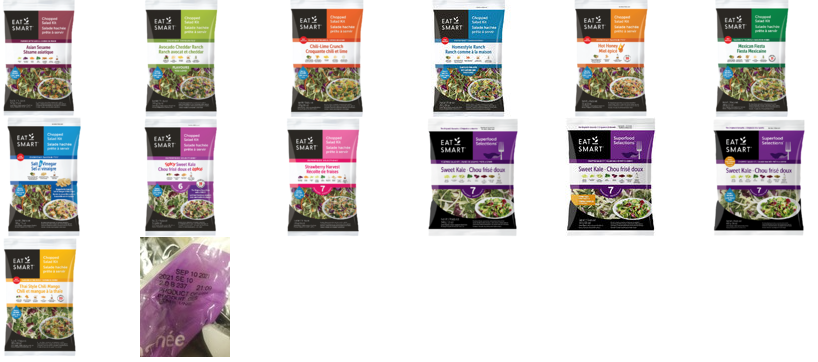In July 2021, CDC, public health, and regulatory officials in several states and the USDA-FSIS began investigating a multistate outbreak of Listeria monocytogenes infections. Epidemiologic, laboratory, and traceback data showed that frozen, fully cooked chicken products supplied by Tyson Foods Inc. were the cause. On July 3, 2021, Tyson Foods Inc recalled approximately 8,955,296 pounds of ready-to-eat chicken products. Additional products made with Tyson Foods Inc. chicken were recalled on July 8 and July 13, 2021. As of September 10, 2021, this outbreak is over. Three people infected with the outbreak strain of Listeria monocytogenes were reported from two states. All three people were in a long-term care facility or hospital when they got sick. WGS showed that bacteria from sick people’s samples were identical, suggesting that people in this outbreak got sick from the same food. USDA-FSIS found the outbreak strain of Listeria in two samples of fully cooked chicken products during routine product testing. USDA-FSIS and partners collected food purchase records from the long-term care facility and hospital to determine the source of the fully cooked chicken products served. USDA-FSIS found that the Tyson facility in Dexter, Missouri, produced one of the products that tested positive for the outbreak strain. The product was supplied to another firm. From this firm, a positive sample was collected. The product was distributed to the long-term care facility and the hospital. @ https://www.cdc.gov/listeria/outbreaks/precooked-chicken-07-21/details.html
ruth
Read investigation details about a Listeria outbreak linked to fully cooked chicken.
ruth
CFIA reports that Erie Meat Products Ltd.( Mississauga, Ontario) recalls Frozen All White Meat Fully Cooked Diced Chicken from the marketplace due to possible Listeria monocytogenes contamination. Retailers, distributors, manufacturers, and food service establishments such as hotels, restaurants, cafeterias, hospitals, and nursing homes should not serve, use or sell the recalled product. The product is unbranded Frozen All White Meat Fully Cooked Diced Chicken, sold in 4.54 kilograms. These Fully Cooked Diced Chicken products marketed, distributed, and sold in the Canadian provinces of Alberta, British Columbia, Ontario, Prince Edward Island, Quebec, Saskatchewan, and Newfoundland and Labrador .@ https://healthycanadians.gc.ca/recall-alert-rappel-avis/inspection/2021/76427r-eng.php
Erie Meat Products Ltd. is recalling Frozen All White Meat Fully Cooked Diced Chicken from the marketplace due to possible Listeria monocytogenes contamination.
ruth
According to the CFIA, European Butcher (Ontario) has recalled Bacon Chuncks meat products from the Canadian marketplace due to suspected Listeria monocytogenes contamination. Bacon Chuncks meat products are subject to this recall European Butcher branded Bacon Chuncks, sold in variable-size, clear plastic vacuum packages of approximately 200 grams each. These Bacon Chuncks meat products were marketed, distributed, and sold in the Canadian province of Ontario. There have been no reported illnesses associated with the consumption of this product. This recall was triggered by the test results of CFIA. @ https://healthycanadians.gc.ca/recall-alert-rappel-avis/inspection/2021/76381r-eng.php
European Butcher is recalling European Butcher brand Bacon “Chuncks” from the marketplace due to possible Listeria monocytogenes contamination.
ruth
The food recall warning issued on August 26, 2021, by the CFIA has been updated to include additional product information. Curation Foods (Santa Maria, California) recalls lots of Eat Smart branded Chopped Salad Kits from the Canadian marketplace due to suspected Listeria monocytogenes contamination. This additional information was identified during the CFIA food safety investigation. The Eat Smart branded Chopped Salad Kits were marketed, distributed, and sold in New Brunswick, Nova Scotia, Ontario, Quebec, and Newfoundland, and Labrador. More than a dozen new salad kits are involved in this recall. @ https://healthycanadians.gc.ca/recall-alert-rappel-avis/inspection/2021/76385r-eng.php
The food recall warning issued on August 26, 2021 has been updated to include additional product information.




